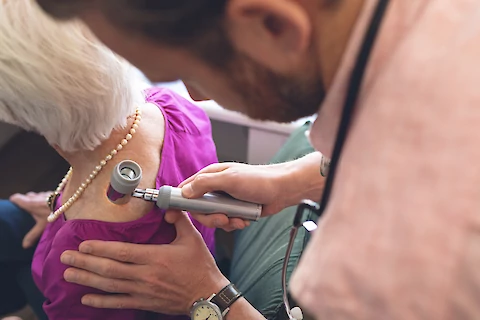
Skin cancer is a common, yet often preventable, health issue affecting millions worldwide. As we age, our risk increases. This makes it even more critical for seniors to prioritize skin cancer screenings. In this blog, we will look into how often seniors should schedule a skin cancer screening appointment, using national or international averages as a starting point, and why more frequent appointments may be necessary.
Factors Influencing the Frequency of Skin Cancer Screenings
Determining the frequency of skin cancer screenings for seniors requires you to consider different aspects of their health and lifestyle. Age plays a crucial role in this determination, with seniors having a higher risk of developing skin cancer. Furthermore, an individual's skin type can make them more susceptible to skin cancer, with fair-skinned people generally being more prone to it.
Another important factor is personal and family history of skin cancer. If you or a close relative have had skin cancer, be more vigilant about screenings. Sun exposure and geographic location also play a significant role in determining the frequency of skin cancer screenings. Seniors who spend a lot of time outdoors or live in sunny areas need to be more cautious and may require more frequent appointments. Lastly, moles or other skin abnormalities can signal a greater need for regular check-ups.
Why Are Seniors at Higher Risk?
There are several reasons why seniors may need more frequent skin cancer screenings than younger individuals. As we age, our immune systems weaken, making it more difficult for our bodies to fight off cancerous cells. This, coupled with cumulative sun exposure over the years, puts seniors at a higher risk of developing skin cancer. Seniors must be proactive about their health and ensure that they're getting regular screenings to detect any potential issues early.
So, how often should seniors have skin cancer screenings? Based on national or international averages, a general suggestion is to have a screening done once a year. However, adjust this based on your risk factors, including age, skin type, personal and family history, sun exposure, and skin abnormalities. Discuss these risk factors with a healthcare professional to determine a personalized screening schedule that fits each individual's needs. In some cases, more frequent appointments, such as once every six months, may be necessary.
Preventative Measures: Self-Examinations and Sun Protection
Seniors can take preventative measures to protect their skin and reduce their risk of developing skin cancer. This includes:
- Performing regular self-examinations of their skin, looking for changes in moles, freckles, or other skin marks.
- Practicing sun protection measures, such as wearing sunscreen with a high SPF, protective clothing, and sunglasses.
- Avoiding tanning beds and sunburns are also essential in lowering the risk of skin cancer.
If any concerns arise during self-examinations or if there is a history of skin cancer, consult a dermatologist or healthcare provider as soon as possible. Early detection and intervention can lead to more effective treatment options and better outcomes.
Need Help With Sun Protection and Skin Cancer Screenings?
Skin cancer screenings are of utmost importance for seniors. Don't hesitate to discuss your risk factors and appropriate screening schedule with a healthcare professional to safeguard your health.
If you or a loved one are in the Knoxville, Maryville, Madisonville, Loudon, or Harriman area, contact Senior Helpers Madisonville for assistance with scheduling a skin cancer screening appointment. Our team provides compassionate care and support to make the lives of seniors healthier and more fulfilling. Contact us today to learn more about our services and how we can help you and your loved ones.